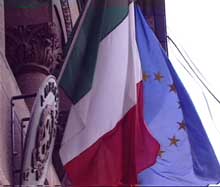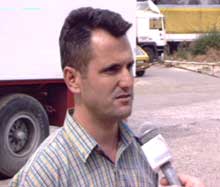|
Enter content here
I'm honest to the point of being naive. I've always been aware of it and openly admitted the fact, said yesterday vice-premier Vassilev commenting the conversation between businessmen Georg Tsvetanski and Mikhail Chernoy published yesterday. The record of the conversation threw in panic ministers and MPs. "It's abhorring! Fools are running the country", ordinary people commented
Ramadani: It Could Have Happened To Me, Too.
A1 TV News - Reality Macedonia
Text by Dragan Antonovski
Translation by Natenane

Flags in front of Italian embassy in Skopje center.
If you ask what is new regarding the "Apostol" case , the answer would be nothing. He continues to serve his time in prison in Foggia in critical health condition.
According to lawyers from Italy, apart from one more inmate who is supposed to help [Apostol] move because he can hardly do that, no medical help has been provided for him yet.
According to unofficial information, Italian ambassador in Skopje interceded with the Italian Ministry of Justice for engaging independent medical team in order to set what condition Apostol Apostolov is in.
Macedonian Ministry sent a note to Italian Embassy in Skopje requesting for another trial, a fair one this time, in order to establish his guilt. The trial should be conduct in the same way as he was sentenced urgently.
Meanwhile, the Internet site www.realitymacedonia.org.mk, being the only site in Macedonia who regularly informs in English on the situation in Macedonia [sic], joined the A1 televisions campaign to help solve this, according to all the evidence, unfair case under the motto "Help Macedonian Citizen Apostol in the Name of Justice".
They [the Reality Macedonia team] ask for support from international institutions and journalists from Europe, especially Italy, to alert the public on Apostol Apostolov, who is unjustly imprisoned in Foggia, as a victim of international organized crime.
The attempt for Apostolov to serve his sentece in humanitarian organisation "Karitas" which is near the prison instead, was rejected by the Court in Foggia explaining that there was a danger that Macedonian citizen repeats his crime.
"Amnesty International" has become interested in this case.

Xhemail Ramadani, a former truck driver from Kondovo, Skopje offers circumstantial evidence corroborating Apostol's story.
Xhemail Ramadani, a former driver from Kondovo village (Skopje region), who now works as a shipper, contacted A1 Television. He is prepared to testify in Italy that Kurd smuggling is deed of Greek customs officials. They are the ones who are part of that criminal act and not the drivers.
Ramadani says that the same thing happened to him - Kurds to load into his truck.
"I didnt report the case in the police because the same thing that happened to Apostol would have happened to me. Nobody else is doing that but Greek customs officials", says Xhemail.
Luckily, he noticed them and chased them away, so he was saved from prison.
"Drivers inexperience and their naiveté is misused by Greek customs officials.
I dont know Apostol personally, but I know the drivers job and I believe that he is innocent. We should all help in the name of the truth", says Xhemail from Kondovo village.
In the meantime, Apostol Apostolovs sister informed the Italian President about the case.
Notorious Report of a Conversation between Tsvetanski and Chernoy Shook Bulgaria.
Standartnews
A crony of the rulers mocked at the Vice-PM, NMS deputies are panic-stricken, people demand resignations.
Yesterday a verbatim report was released of a conversation between Israeli businessman Michael Chernoy and notorious businessman Georg Tsvetanski. The latter works for Tobacco Capital Partners - the favourite in the deal on Bulgartabac. In the scandalous release, Vice-PM Nikolay Vassilev is qualified as a "fool" several times by Tsvetanski. The publication shook this country and caused panic among the NMS MPs. Vice-PM Nikolay Vassilev himself looked exhausted and older. He succeeded in evading journalists for a while though ultimately he was forced to elaborate on the statements of his crony Tsvetanski: "I'm aware of being naive," the minister of economy admitted modestly.
Bulgaria announces sale of its tobacco monopoly.
By VESELIN TOSHKOV, Associated Press Writer
SOFIA, Bulgaria - Bulgaria agreed to sell its state owned-tobacco monopoly Friday in a deal considered to be a major test for the Balkan country's reformist government and its efforts to attract foreign investment.
The sale of the state-owned Bulgartabac Holding to Sofia-based Tobacco Capital Partners and Dutch-registered Clar Innis is considered one of the largest privatization deals this year.
The deal is critical for Bulgaria, which is struggling to meet tough budget guidelines mandated by the European Union, which it hopes to join in 2006.
The Balkan nation has been anxious to shake off its communist legacy and open its markets to foreign investors, but has struggled over how to best introduce reforms.
The consortium offered 110 million euro (dlrs 109 million) in cash for 80 percent of the assets. It also pledged to invest about 71 million euro (dlrs 70 million) in production over the next five years.
The other contenders included Russia's Metatabak; Austria's Tobacco Holding Gmbh; and a second Russian consortium, Rosbulgartabak.
The winner offered the best overall package, including price, investment pledges, and employment strategy, said Apostol Apostolov, the chief of the privatization agency. The deal is expected to be completed in 45 days.
Bulgartabac's businesses include 12 processing factories and nine cigarette factories. It also has five cigarette-making factories in Russia and one each in Ukraine, Romania and Yugoslavia.
Bulgaria, a traditional tobacco-growing country, produces some 40,000 metric tons (44,000 U.S. tons) of tobacco a year.
Two NATO Aspirants Assume Strategic Roles.
WSJ.com, 23 Aug 02 By VLADIMIR SOCOR
The prospect of military action to remove Saddam Hussein from power in Iraq increases the impetus for NATO's enlargement to the Black Sea. From U.S. air bases in Germany to Iraq, the direct flight path traverses Romania or Bulgaria. These two Black Sea countries also provide a strategic connection between an enlarging NATO and the energy-rich Caspian region. As aspirants to NATO membership, Romania and Bulgaria are active members already of the American-led military coalition of the willing against terrorism.
Only a few weeks remain until NATO decides which aspirant countries are to be invited to commence the accession process. The alliance stands before a unique historic opportunity to enlarge eastward across the broad front from the Baltic to the Black Sea. Estonia, Latvia and Lithuania are front-runners in meeting the economic and political criteria for admission to the alliance, as well as in building modern militaries from scratch. For their part, Romania and Bulgaria are now struggling to recoup the time lost by preceding governments on internal reforms. Heirs also to bloated and obsolete armed forces, they are biting the bullet of rapid downsizing and modernization of their militaries, moving from the conscript system to professional forces.
Recent polls show that 80% of Romanians and 77% of Bulgarians favor joining NATO . This far exceeds the levels recorded in the other aspirant countries. Significantly, pro-NATO sentiment in Romania and Bulgaria before Sept. 11 was almost as high. This consensus helps sustain high spending on military transformation and NATO-related activities at a time of acute social hardship. While NATO expects member and aspirant countries to spend 2% of the annual gross domestic product on defense, Bulgaria currently allocates 2.8% (highest among all aspirants) and Romania, 2.4%. Many countries in NATO consistently fail to meet the 2% benchmark.
In many ways, Romania and Bulgaria are already acting as members de facto of the alliance. In 1999, the two countries not only facilitated the access of NATO forces to the Western Balkans, but turned down Russia's demands for air corridors that would have resupplied Slobodan Milosevic's army. Since then, a growing number of Romanian and Bulgarian soldiers have gained the experience of operating with allied forces on peace-support missions in the Balkans.
As part of their host-nation support commitments, Romania and Bulgaria have earmarked seaports and airfields on their territories, for use by U.S. and allied forces in peace support or antiterrorist operations. Bucharest and Sofia have, each, established National Coordination Centers to facilitate the movement of land, air and naval forces of NATO countries. They also have each signed and ratified special agreements with the U.S.: one agreement authorizes the overflight, transit passage and stationing of U.S. forces in Bulgaria; the other is a status-of-forces agreement which confers legal status on U.S. military personnel to be stationed in Romania. The Romanian government also permits U.S. military overflights, including those carrying troops or dangerous materials.
Those steps answer to the requirements of antiterrorist operations in the post-September 11 world. Beyond their own region, these two countries are beginning to contribute to power projection by the U.S.-led antiterrorist coalition. Romania has recently deployed more than 500 soldiers to Afghanistan. Transported and resupplied by Romania's own C-130 Hercules aircraft, most of the Romanian contingent serves alongside U.S. troops near Kandahar in the operation Enduring Freedom. For its part, Bulgaria has deployed a platoon-sized unit near Kabul as part of the International Security Assistance Force.
Once it secures the Black Sea's western rim -- and cements the link with the southern, Turkish rim -- NATO will be better positioned to reach out to Georgia and Azerbaijan and uphold a common set of interests centered on regional security, energy development, and transit routes. The Black Sea is inseparable from the Caspian in terms of both security and international economics. The continuum, stretching from the Balkans to the eastern Caspian shore, also links NATO Europe with the U.S.-led forces stationed in Central Asia, and might also serve to do so with forces that would deploy for action in Iraq.
On the Black Sea's northern rim, Ukraine also provides a crucial air corridor between Europe and the Asian theaters of anti-terrorist operations. Romania's and Slovakia's accession to the alliance would substantially extend Ukraine's common borders with NATO . Three years ago, the alliance's first enlargement round in Poland and Hungary secured Ukraine's western flank.
The second round, besides securing the southwestern flank, should also encourage Ukraine's own quest for eventual membership in NATO.
Long before Sept. 11, the need for westbound outlets from Central Asia and the Caspian basin had dramatically increased the significance of the Black Sea in international economics and politics. The post-Sept. 11 events maximized the Black Sea's military-strategic significance. Yet, European awareness of this development seems low. The EU's transit projects languish underfunded, and the leading center for Black Sea security studies is in the U.S. at Harvard University, not in Europe. In these and most other respects, America and Turkey bear the heaviest of Europe's burdens in the Black Sea.
NATO's two enlargement rounds -- one consummated in 1999, the other coming up soon -- have motivated the aspirant countries to throw historic enmities aside and join forces in the common interest. Hungary supports the early entry in NATO of Romania, while the atmosphere between Romanians and Hungarians in Transylvania has never been better. The same is true of Bulgarian-Turkish relations and the situation of Turks in Bulgaria. Meanwhile, Turkey and Greece disagree on many things but are working together to accelerate Romania's and Bulgaria's accession to the alliance. These countries' entry in the coming round -- along with that of Slovakia and Slovenia -- would at long last close the gaps that separate Turkey, Greece, and Hungary from the rest of NATO , extending a Pax Atlantica from the Baltic to the Black Sea.
Proposals Are Expected from Elena Yontcheva.
INTERVIEW Standartnews: Kiril Gotsev

Antoinette Peteva
If I approve the rejected concepts, the viewers will laugh at the producers, says chief of the Bulgarian National TV, Kiril Gotsev.
Kiril Gotsev was born in Sofia in 1957. He graduated from the Technical University in Sofia as a radio and TV engineer. He is working in the BG National TV from 1985. On March 4. 2002 the Council for Electronic Media appointed him to the post of the director of the state-run TV.
- Mr. Gotsev, how many of the submitted 60 projects for program development will be approved to appear on the air?
- We'll see, I don't know yet. Many producers call me and ask, "How come my program hasn't passed?" If I let through all the rejected concepts and the viewers have a chance to read them then for some of the producers it would be better not to show up in public at all, because they will be the laughing stock of the world. We made a contest and saw that there is a market of people who are willing to develop programs. However there is no market of fresh ideas.
- How far have reached in negotiations with Elena Yontcheva? Will she make a come back to the BNT?
- We haven't negotiated yet. When she is ready with her proposals she'll come and we'll discuss the details with her. There's no problem.
(Abr) Spain to Suspend Basque Nationalist Party Batasuna.
Reuters
MADRID (Reuters) - Spain's public prosecutor on Friday approved the suspension of Basque nationalist party Batasuna, supporting a judge's allegation that the group supports and funds the armed separatist group ETA, court sources said.
High Court Judge Baltasar Garzon is due to order the ban on the hardline group on Monday, giving the party time to reply to his allegations in writing.
Regional authorities in the turbulent Basque region of northern Spain are then expected to send police to close the party's headquarters and local offices.
Police in the Basque Country were already on alert for possible ETA reprisals after Batasuna leader Arnaldo Otegi warned the regional government this week the prohibition would have "undesirable consequences."
Batasuna shares ETA's aim of achieving an independent Basque state in parts of north Spain and southwest France. While the party's leaders deny Madrid's accusation that it is the political wing of the armed group, they refuse to condemn ETA violence, which has claimed 800 victims since 1968.
The suspension is only one of the legal mechanisms under way in Spain to close down Batasuna. On Monday, Prime Minister Jose Maria Aznar will ask parliament to begin judicial proceedings to outlaw Batasuna under a controversial law which allows parties to be banned simply for not condemning terrorism.
|



